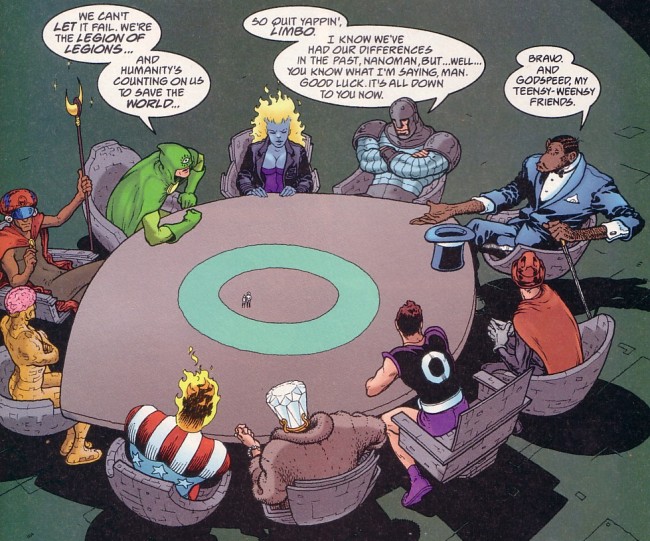


This Week in Panels: Week 100 SUPER SPECIAL EXTRAVAGANZA! (Part 1)
August 22nd, 2011 Posted by GavokGod, has it been 100 installments of this garbage already? Well, I said we’d be doing something special and I wasn’t lying. The regular update is merely the appetizer.
So for those of you seeing this for the first time because of the allure of triple digits, here’s the skinny: every week, me and my crew (usually 4L boss man David Brothers and readers Was Taters and Space Jawa) supply panels for all the comics we’ve read from the previous Wednesday. Each panel is meant to be a breakdown of what the comic is about. The essence. The chance to sell it and show off its tone. Give you an idea of what its contents are all about. Yes, some people actually enjoy this. Go figure.
Now let’s get moving.

Avengers #16
Brian Michael Bendis and John Romita Jr.
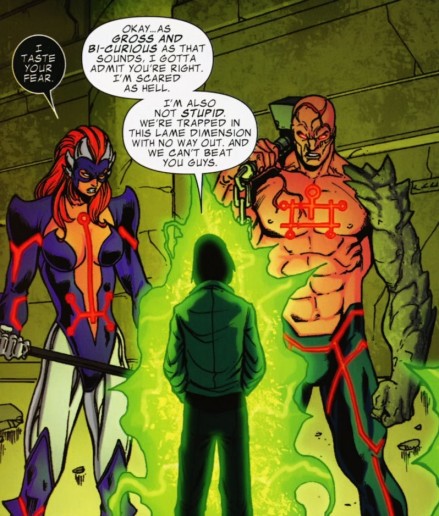
Avengers Academy #18
Christos Gage and Andrea DiVito

The Cipher 04/06/11: “Imagine if this was the last rhyme I ever wrote”
April 6th, 2011 Posted by david brotherscreated: I read a Wiki article the other day about Impostor syndrome. It’s an interesting read, and I’m pretty sure I waffle between that and a sense of absolutely delusional entitlement regularly.
–Ten panels you should’ve seen at Wondercon
–A really obvious April Fools’ Day post
consumed: I went to Wondercon and got sick. I was wrecked yesterday and am only slightly better today, but I should be good to go tomorrow. I hardly ever get sick, so each time is like the end of the world. (What a crybaby.)
–Jay Potts got his book funded! I’m really happy that this happened. Black comics, baby! Congrats to Jay. Looking forward to seeing the book.
–How Slavery Really Ended In America is an interesting read. I’m only a couple pages in, so maybe it goes south at some point, but thus far? Super interesting.
–Zom of the Mindless Ones takes a swing at Frank Miller, Lynn Varley, and Klaus Janson’s Joker, with an eye toward David Bowie. I liked this read. It’s a pretty interesting examination.
-I got the new Fantagraphics catalog in the mail, and guess what’s in it! Michael Kupperman’s Mark Twain’s Autobiography 1910-2010! Kupperman is one of the funniest dudes in comics (it’s him, Kyle Baker, Sergio Aragones, and ???), and his Mark Twain post was super funny. Here’s an excerpt from Tales Designed to Thrizzle 6, one of the funniest comics ever:
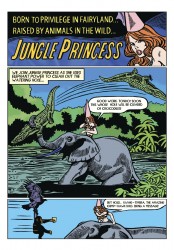
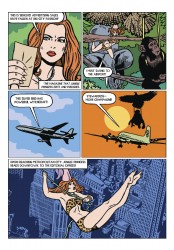
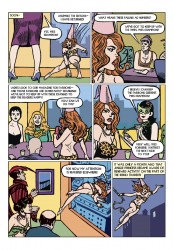
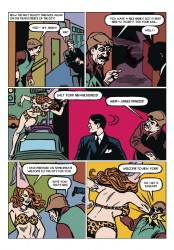
So, yes: I’m buying this one as soon as it drops.
–The Daily Crosshatch had a good interview with Stan Sakai of Usagi Yojimbo fame.
-Coming via Cheryl Lynn is this bit of dopeness:
SOUL MAN™ Teaser Guillaume Ivernel (Blacklight Movies) from Blacklight Movies on Vimeo.
-Sean Witzke is back to writing about comics, and wow, he’s making my days. On Dan Slott, Marcos Martin, and violence in cape comics:
You want to do the story where Spider-Man saves everyone, makes sure that no one dies, gets some new armor with some cool magnetic webbing, outsmarts the bad guy and rubs it in J Jonah Jameson’s face? Do it without talking about it. Calling all this attention to death, it makes the entire endeavor feel awkward, it consistently points out that this is a problem with reading a superhero comic with real world consequences. If you want to do something old school and tell classic Spidey stories, WHY NOT JUST DO IT? This is caught in the middle and satisfies neither side.
On Rick Remender, Jerome Opeña, and action in comics:
This isn’t nostalgia comics, it’s a job for these guys – almost in the mode of the shittiest Batman comics that come out – it has Wolverine and Deadpool in it, and it comes out in 6 weeks, do whatever you want. And Remender and Opena, they want to do a comic with some great fight scenes, and for me that’s always been something undervalued as a reason to make a comic. Especially in a place where comics are now, where real action is now much more of an idea you play to (which I think happens in all kinds of comics, from the Fort Thunder indie stuff to huge Marvel/DC crossovers, action is a pose more than anything). Giving a shit about things like fights and chases always makes me feel a bit silly, but it’s what I care about and I enjoy seeing it done right and hate when it’s paid lip service to. Uncanny X-Force is a comic that understands what it is, and then goes about being the best dumb fight comic it can be.
So I bought it, I thought the idea of Tintin traveling through Interzone sounded far enough away from coming of age and the 70s and Baby’s First Body Horror Reader. I bought it, because I am an idiot who actually listens to people, and the preview art looked great. I paid $20 for this. Those Tintin books that have 3 reprints in one are only $18.
-Some scrub on Twitter (retweeted here) called Sean’s work “Not the type of criticism the world needs.” Hahaha. Get real, homey.
-I can’t think of anyone who writes about comics like Sean does. The way he blends cinema theory (is that a word? “the way movies work”) and comics theory is endlessly fascinating to me, because I like movies, but I don’t know them. Sean can spot directors swiping other directors, which is basically magic, as far as I’m concerned. That’s a voice that I need to be reading, and that’s just the most obvious touchstone for his work.
-It’s cool to not like people, but to pitch it as “Oh, this guy is hurting the form,” like there’s some objective way to grade criticism? You need a dummy smack for that one. If somebody sucks, say they suck. Don’t get all bougie about it and try to justify your dislike.
-I always find discussions of what criticism is or should be to be pointless, but hey, I’m home sick from work and doped up, so let’s get it in.
-People are gonna believe what they want to believe about your work, according to their own interests. I’ve had people tell me that I’m too negative online. That’s funny, because I posted about 25 times in February for Black History Month, and one post about a dumb Gorilla Grodd comic came close to getting more comments than everything I wrote in February combined.
-I’m negative? C’mon, b. I spent the latter third of last year depressed out of my head and still managed to give sloppy kisses to dozens of comics I loved. Check the rhime if you don’t believe me. Do your homework.
-The internet’s backwards. People pay attention when you savage (or lightly insult or even ignore, at this point) something, because 1) controversy (intended or otherwise) brings in hits and 2) everybody likes a chance to tell you you’re wrong. Post about something you like more than most people you’ve met? Deafening silence. It should be the other way around.
-That’s the secret of why every site does top ten lists. They invite hits and angry comments.
-I could post tomorrow on that dumb looking American Panther thing, with some very well thought out and reasonable points, but I’d rather do what I’m doing right after I finish this point: write about Stan Sakai’s Usagi Yojimbo and figure out some way to explain Moebius to a general audience.
-The more I think about it, the dumber I think “not the type of criticism the world needs” is an incredibly stupid thing to say. It’s just–there’s this layer of elitism in there, an implicit statement that criticism needs to be a certain way to be valid, that valid criticism exists, and all of this other garbage that I hate.
-It reeks of stuffy academia, where knowledge is only kept by those who have been properly trained or let into a special criticism club. It’s rockism for comics, and I hate it. Maybe that’s my lack of education and public school upbringing, I dunno.
-But I do know that me and mine could eat people who think like that for lunch.
-There’s no right way to do criticism. It’s anything goes martial arts. You can savage books all day long, talk around them, new games journalism them, dissect them, or recap them. If it’s good, it’s good. No one “needs” any type of criticism, either.
-We’re all nobodies, baby. “I just wanted to talk about the comics, see? All those shitty, amazing comics…”
-It’s a good time to be a comics fan. Heroes for Hire went a little soft in the art department this week, but, man, was that a good issue or what? Misty Knight uber alles, dang.
-I need to figure out what I should write about Joe Casey and Mike Huddleston’s Butcher Baker. I’m feeling it, though.
David: Heroes for Hire 5
Esther: Esther’s comics purchases for today have been called on account of bad plots and crossovers
Gavin: Axe Cop Bad Guy Earth 2, Secret Six 32, Irredeemable 24, Deadpool Family 1, Herc 1, Heroes For Hire 5, Marvel Zombies Supreme 3, Ozma Of Oz 5, Ultimate Comics Captain America 4, (Maybe) Fear Itself 1

Fourcast! 68: What’s It All About
November 29th, 2010 Posted by david brothers-Ever disagree with someone and be like, “Wow, [that idea] is totally way off kilter and crazy!”
-I totally thought that when Esther wrote this post in response to a lightly NSFW post I wrote about Flex Mentallo and supersex.
-Why not do a podcast about our competing and almost definitely irreconcilable views on superheroes?
-So, we’re hashing it out on wax, and Esther realizes it before I do…
-But we don’t disagree very much at all, do we?
-Like I ever let something like that stop an argument.
-Regardless, I’m inflicting this conversation on you, dearest reader, so click play and tune in.
-6th Sense’s 4a.m. Instrumental for the theme music.
-See you, space cowboy!
Subscribe to the Fourcast! via:
–Podcast Alley feed!
–RSS feed via Feedburner
–iTunes Store

Gamble a Stamp 03: Superhero Comics Are Dead
October 24th, 2010 Posted by david brothers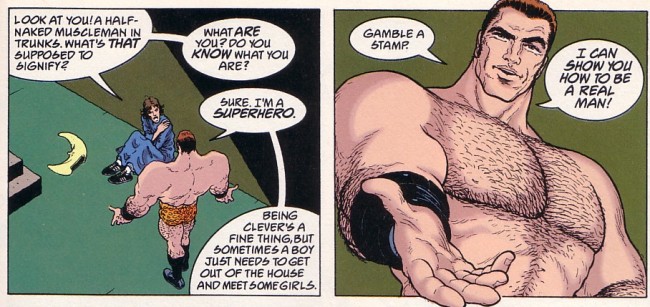
The story goes that Dark Knight Returns was born when Frank Miller realized that Bruce Wayne was younger than he was. This character that he’d looked up to, or at least enjoyed, since he was a kid in Vermont was suddenly younger than he was. Miller was getting old, and part of getting old is looking at the things you loved as a child stay young. The aspirational aspect of superheroes, the “Gamble a stamp!” element that makes the genre so fascinating, is a little tougher to swallow when you’re finding wrinkles in new places and Bruce Wayne is still 29 years old.
So, Miller added twenty years to the character and in doing so, plowed fresh ground. Batman became someone Miller could look up to again, with his universe and methods updated accordingly. Superstitious and cowardly criminals were replaced with a threat birthed from societal collapse and the apathy of good men. Batman turned pointedly political, and Miller took on Reagan and pop psychology over the course of DKR. He created Carrie Kelly and made her the new Robin, both updating and critiquing the Robin concept.
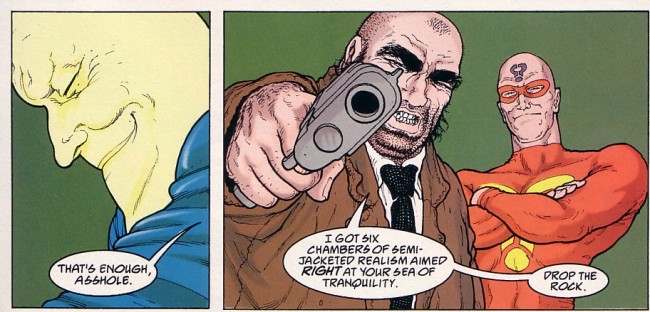
Getting older killed the superhero for Miller. He couldn’t relate as he once did, and he took steps to make superheroes cool one last time. Dark Knight Returns is a blaze of glory for the superhero, that last, brilliant blast of light before death. It says that these dusty old characters are still just as vibrant as they once were, but not in the same ways. People grow old and change, and their interests change with them. At the end of DKR, Batman isn’t a soldier in the war against crime like he once was, and like he is now. He was a general, as his severe turtleneck and demeanor suggests. He’s leading the war, not fighting it. He grew up.
Alan Moore and Dave Gibbons’s Watchmen came from Moore wanting to write a superhero story with weight, something like Moby Dick in particular. He wanted to write a superhero for adults, and chose hard-edged pessimism to get the job done. Its rigid structure shows a world that has no use for acrobatics or melodrama. It has no place for many of the staples of cape comics, whether you prefer Jack Kirby-style action or classic stylings of Curt Swan.
Watchmen, then, is an autopsy. By the end of it, all of the secrets of the superhero are laid bare. You see the paunches and watch their muscles sag. You get a front row seat to Nite Owl’s impotence and the way superhero costumes function as fetish objects. Rorshach is revealed as being not that much better than the villains he fights. An old man gets his brains beaten out, the only true superhero is so alien as to be inhuman, and in the end, the villain wins and saves the world. The heroes? They compromised because to actually defeat the villain would have resulted in the destruction of world peace. Rorshach refuses to compromise and is killed for it.
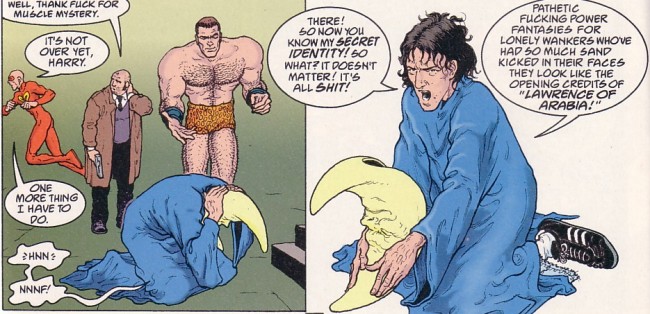
All of your illusions and ideas of the superhero are deconstructed and proved false by Watchmen. They’re normal people, rather than superheroes, and act accordingly. There’s no magic, no aspirational aspects, and nary a wink from Superman. Just hard edges and gritty realism.
DKR is the blaze of glory. It’s a revitalization before death. Watchmen is the autopsy. At the end, there are no secrets. What’s Flex Mentallo? It’s a wake, that time when everyone gets together, gets drunk, and talks about the deceased.
Wally Sage is overdosing on painkillers in Flex, but that’s not all he’s taken. He’s had a bottle of vodka, a couple e pills, a quarter ounce of hash, and he’s tripping on acid, too. As he’s dying, he’s talking about all the amazing comics he read. He’s talking about the good, the bad, and the irrelevant. He’s painting a picture.
The picture he’s painting is of the full spectrum of comics, or at least the full spectrum of the comics he read as a child. He talks about how exciting they were, how sexy, and how scary. He talks about how superheroes couldn’t stop his parents from fighting or save us from the bomb. Flex is about how fiction is real, and the way that the two rub up against each other and interact at certain points.
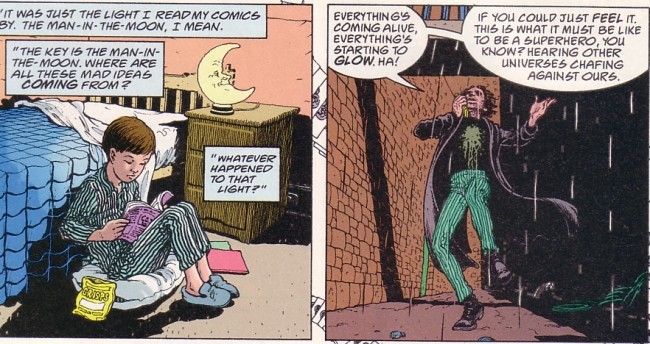
Flex Mentallo is a hopeful book. At the end, the superheroes return to save us all. They are revealed as us, or at least a significant part of us. Flex saves the day. The magic of reading superheroes as a kid is adapted to the real world. The glow of the lamp that Wally read comics by as a child serves as a blatant metaphor for the brilliance of superheroes. At the end of the book, the light is restored to Wally’s sight.
Flex is a celebration of the superhero. All of it, from good to bad, from perfections to imperfections, is important. The sexualization of superheroes serves a purpose, either as masturbation material or as an outlet for the creator’s desires. The Silver Age zaniness provided a look into other worlds, whether unsettling or fantastic. The escapism provided a look into a better world. The Starlin acid trips, the fear of the superhero, the edginess, the pointlessness, all of it matters. All of it fits together. It’s all part of the same picture. All of it is wonderful, in one way or another. It’s a puzzle with a million parts that still manages to stay in sync.
And in one of the last scenes, the point of Flex is laid bare. “Look at you! A half-naked muscleman in trunks! What’s that supposed to signify? What are you? Do you know what you are?” asks a teenaged Wally Sage. Flex shrugs and says, “Sure. I’m a superhero. Being clever’s a fine thing, but sometimes a boy just needs to get out of the house and meet some girls.”
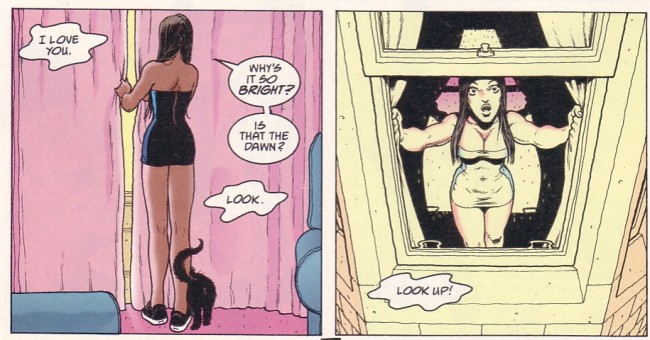
Implicit in Dark Knight Returns, Watchmen, and Flex Mentallo is a critique of the superhero. DKR teaches that the superhero is broken and it must be made cool again. Watchmen teaches that the superhero is broken, and here is how it is broken. Flex teaches that superheroes are broken, but that brokenness is just as natural as the parts which aren’t broken. Blaze of glory, autopsy, wake.


At the heart of superhero comics?
October 19th, 2010 Posted by Esther Inglis-ArkellI read over David’s Gamble a Stamp 2 a while ago, and came across a sentence that brought me up short. Re-reading it today, I have the same problem with the same sentence. That sentence?
At the heart of almost every hero is that directive: “save us.”
There are a lot of different kinds of superhero comics, especially now, when everyone is looking for a fresh take on the same concept. A lot of comics focus on a lot of things. Reading them, however, the impression I get from the books has never been, “save us.” That’s backwards. The directive at the heart of every comic is this: “I can save you.” It’s not altruism, it’s egotism.
I remember seeing a documentary about comics in which Siegel and Shuster talked about the inspiration for creating Superman. They talked about the adventures or the heroism, but mostly they talked about how they daydreamed about how some guy who was a total loser in life turned out to secretly be the most fantastic guy ever. The insults of everyday life didn’t matter, because they were all part of a game he was playing as one identity. As the other, he didn’t just kick around thugs, he went after evil businessmen, crooked senators, and Hitler. And he defeated them all. Easily. Superman’s entire selling point was this; “Give me enough power and put me in charge, and I will fix everything.” Haven’t we all felt that way?
As times changed, and problems became more difficult, Superman was joined by Spider-Man. Things weren’t as easy for him. While Superman’s rotten civilian life was part of a game, Spider-Man’s personal defeats were real. He suffered. But he suffered because he chose to use his power to put things in order. Spider-Man comics acknowledged a personal cost, but it was a personal cost which lead to victories.
The defeat of evil isn’t really a goal in superhero comics. It’s a means to an end. This guy is kicking and punching people. This kid is off having adventures instead of going to school. This woman is ditching her boyfriend to run off into the night and prowl. Oh, they don’t want to. Who would want to do such a thing? They have to. Because they must fight evil.
There are few comic books that don’t follow this principle. Even the ‘darker’ books, which make fun of the supposed ‘supers,’ and have amoral characters, have those characters fight unsympathetic people. Sometimes they’re anonymous annoyances, sometimes they’re evil characters with respectable faces, but almost always they have forced, *forced*, the heroes out of the peaceful life they once had and made them go on these perilous adventures.
In this way, the sexuality of comics – also discussed in the that entry – makes sense. Oh no! I have to go through an orgy! Oh no! The costume of the Pink Lanterns (come on. they’re pink.) forces my girlfriend (or me) to show of her (or my) absolutely perfect body! Why, oh why, is this happening?
I’m not saying this is a terrible thing. A little ego boost, a little identification, is pretty fun. And these concepts do allow creators to tell wonderful stories that often have intelligent points and emotional depth.
But no one reading them needs to be saved. If you have the time to follow the plot of these stories, the access to them, and the money to buy them, you are already saved compared to a huge chunk of the rest of the world. You are one of the most saved people on earth. You don’t read them to be saved. You read them because you want to be the saviour.

Gamble A Stamp 02: Fredric Wertham Was Right
October 14th, 2010 Posted by david brothers
NSFW images after the jump. Let’s talk about sex, baby. Let’s talk about you and me.
Read the rest of this entry �

Hey, Wally Sage! [Neonomicon #2]
October 11th, 2010 Posted by david brothersHey Wally Sage, star of Flex Mentallo and lifelong comics fan, how do you feel about Alan Moore and Jacen Burrows’s Neonomicon 02, published by Avatar Press?
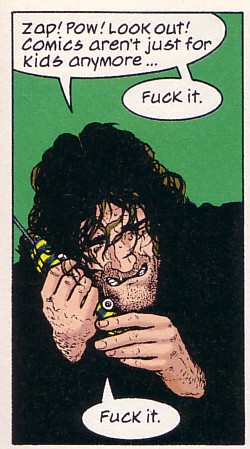
Yeah, me too, buddy. That book was vile and put me off Alan Moore entirely. Jog’s review explains exactly how foul it is, and has a few of the reasons why I hated it.

Gamble A Stamp 01: It’s Only Like Heaven
September 29th, 2010 Posted by david brothers
I think that if you are a fan of superhero comics, Grant Morrison and Frank Quitely’s Flex Mentallo should be your holy book. It caused a seismic shift in my enjoyment and understanding of superheroes after I read it, simultaneously deepening my enjoyment of the good stuff and my willingness to ignore the terrible. It’s a story, it’s comics journalism, it’s a history lesson, it’s evergreen, and it is auto-critique in pamphlet form. It’s about comics, you see, and if you haven’t read it, you should. This is part of a series of posts relating to the book.
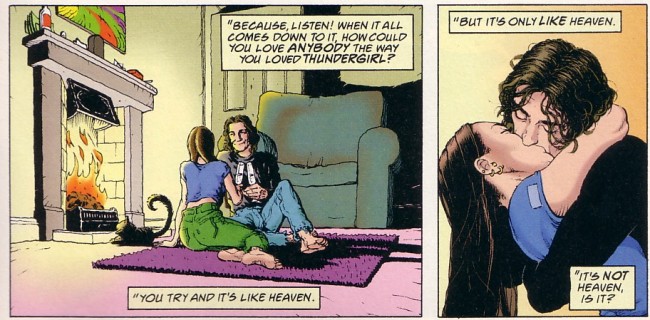
At one point in the book, Sage says, “Because listen! When it all comes down to it, how could you love ANYBODY the way you loved THUNDERGIRL? You try and it’s like Heaven. But it’s only LIKE Heaven. It’s NOT Heaven, is it?” It’s one of those points that stuck with me after reading, kind of like “Sometimes her cigarette smoke smells like flowers” from Brandon Graham’s King City carved out a space in my skull.
A teen in the throes of puberty and wishing for a Mary Jane Watson of his very own isn’t wishing for a real girlfriend. He’s looking for someone who resembles the stories and beliefs that he has built up around Mary Jane. Maybe she likes his favorite kind of music, has a certain cup size, or will do all those nasty things in bed that he’s been curious about.
What can compare to that? The only possible end point of that is disappointment. No matter how much you love someone, no matter how heads over heels they are–they’ll never be Mary Jane Watson, tiger. You can’t build a lover out of ideas. And yes, on the very next page: “What’s like Heaven? Shit. Oh shit. They fuck you up, those comics. They really fuck you up…”
Just like romance movies, fairy tales, sitcoms, and every other thing that tells us how life is before we get to experience it ourselves, superheroes sell us a reality that only works with archetypes. Every romance is an atom bomb of passion or strife. Lovers embrace against all odds and damn the consequences. No one gets to settle for someone they didn’t want or to be content with somebody who is just okay. Love triangles aren’t a ball of stress and drama so much as an entertaining diversion. No one comes home, hugs their wife, and goes to bed early. Everything is larger than life. Superheroes go hard or go home. There is no in-between.
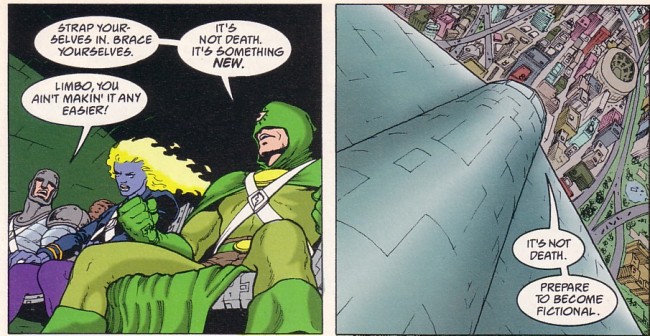
At the same time, this is the strength of superheroes. Superheroes exist as archetypes that have been drawn from the same collective unconscious that has been creating stories about heroes for thousands of years. They represent abstract or unquantifiable values–responsibility, vengeance, altruism, guilt–and work out our insecurities and fears on the comics page. Spider-Man insists on a world where people take responsibility according to their ability, no matter how marginal. Batman is about emerging from darkness, away from your baser instincts, and into the light. Superman is a father figure, there to protect us from all possible harm and guide us on our way.
One of the points of Flex Mentallo is that superheroes exist to save us from ourselves. They provide an example for us to follow and embody the best aspects of human nature. They represent the hole that’s present in reality, the thing that’s missing that resulted in the world being in the shape it’s in. They’re the memory of a better time.
Flex provides a reason for comics to traffic in the stories that they do. The superheroes exist outside of the comic books, having escaped from their doomed reality by becoming fictional in ours, and live in our imagination. The comics are an attempt by the superheroes to show us what things could be like, if only we tried a little harder.

Sage’s feeling about Thundergirl and love–it’s not just about love. It’s deeper than that. It’s about archetypes, period. Your father may make you angry and let you down. Your friends may betray you. But, when you get down to it, Spider-Man will fight to the death to save you. Superman will always be there with a kind word when you need it. His stories and his reasons for being don’t change.
This is the power of superheroes. They touch on something deep inside us, whether as adults or children, and show us something we need to see. This is one of several messages in Flex Mentallo, and it’s one that places superheroes on a direct level with every other story. They represent something bigger than themselves and better than us.
How could you trust anybody the way you trust Superman?

Cam Stewart, Graeme McMillan, Secret Origins
January 11th, 2008 Posted by david brothersI think my first Cameron Stewart book was Seaguy. I’m pretty sure it was, anyway– I didn’t become a Brubaker/Stewart Catwoman fan until they were nearly off the book. I’m a little fuzzy on that point, though, I might be wrong.

Either way, the man is crazy good. Every book he’s ever done looks 2008% rock solid. He’s got a fun and expressive cartoony style. Lately, I’ve been enjoying the man’s ongoing webcomic at Transmission-X, Sin Titulo. Link to the first page here, as that previous link takes you to the latest comic. Whoops, should have warned you I guess!
Anyway, the comic is really good. Stewart has a pretty smooth writing voice and the story is really engaging, though I’m not sure where it’s headed. Plus, I can get my Cam Stewart fix once a week this way. That’s good stuff.
It’s funny, but I haven’t thought about Seaguy in a long while. In a very real way, Grant Morrison’s Seaguy and JLA Classified #1 were the reasons why I started blogging about comics around this time in 2005. My first comics blog was Guerilla Grodd (shut up it was clever back then). My first post was on JLA Classified #1. A few posts later, I posted the first of two explorations of Seaguy, with an imaginary third rounding out the trilogy. I really want to rewrite these. It’s been a while since I have really dug my teeth into a subject, not to mention reread Seaguy. I feel like I could bring a lot more to the table now.
Speaking of blogging in 2005, one of my favorite sites was Fanboy Rampage. It was a linkdump of all the best (worst) comics fans had to offer and run by one Graeme McMillan. I don’t think I’m exaggerating when I say it was probably my favorite comics blog back in the day. Imagine my surprise when I move to SF this year and the guys are like “Hey, do you know Graeme?”
So, yeah, Graeme McMillan is cool people and I’m pretty pleased to call him buddy. He’s got a fun interview with Tom Spurgeon over at the Comics Reporter. Give it a look, all right?
Man, do you guys remember when comics blogging was all The Beat, Journalista, a little Warren Ellis (“The Bendis Board is full of rape-os”), Fanboy Rampage, Neilalien, and ADD? I feel like I’m leaving people out, but it’s late and my memory is bad. Casey and Fraction on the Basement Tapes, Augie on The Pipeline… Three years, man. Wow.
Controversial opinions–
–Have you ever wished for the death of a comics creator, be it an EiC, writer, or artist? Maybe an editor or colorist if you’re really into funnybooks? If you can answer yes, you probably suck as a person. It’s just comics, man. Chill out.
–The “comics fans are shut-ins/creepy nerds/worthless man-boys/fat/neckbearded/stunted” stereotype needs to be lost, stat. It doesn’t matter whether you’re explaining why comics are sexist, poorly written, racist, or whatever– lose it. It ain’t true, man. I know a bunch of people who read comics. I don’t know any shut-in creepos. Let those dudes do their own press– we don’t need to do it for them. Real recognizes real and they need to be invisible.
–Have you ever used the word “overrated” in a review? If you did, I probably didn’t finish reading what you wrote. Overrated is a stupid word that has no place in a review. It basically means “This is popular and I don’t like it so I’m going to diss everyone else’s opinion in an effort to make myself look smart(er).” You might as well be saying “as if” as far as I’m concerned.
–Seriously though– it’s just comics. It’ll be okay. Go read Kraven’s Last Hunt or Batman: Year One or Flex Mentallo or Casanova or something you haven’t read yet that’s generally well-regarded if comics right now are making you mad. If it’s getting your blood pressure up, back up off it. It ain’t worth it. It’ll come around.
–I’ve been listening to Lupe Fiasco, T.I., and Juelz Santana pretty much exclusively for the better part of a week now. It’s a weird mix of maybe 16 hours of music (9 of T.I., 5 of Lupe, and 2 of Juelz). T.I. for the south (deuces up, a-towns down), Lupe ’cause he’s a nerd, and Juelz because he’s sick at storytelling. “Gone” is dope.
Youtubes, which are probably nsfw if only for lyrics and the fact that they’re youtubes:
Lupe Fiasco: I Gotcha, Dumb It Down, The Cool (Music only)
T.I.: Big Things Poppin’, Hurt, U Don’t Know Me
Juelz: Oh Yes, Dipset Anthem, Gone (Music Only)
Man, I love that sample on Oh Yes. “Wait a minute mister mista mista mista”

